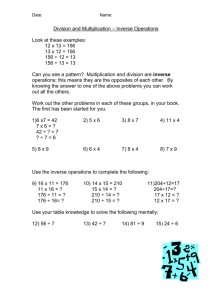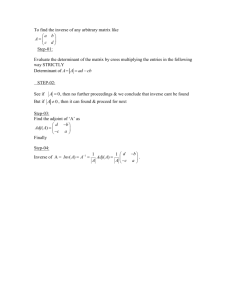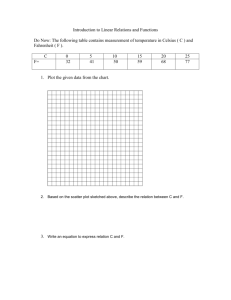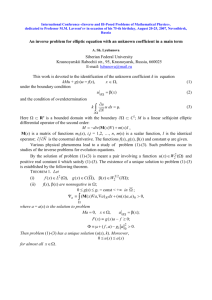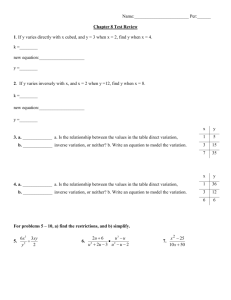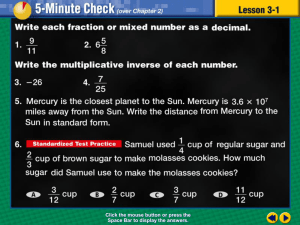Squaring and Rooting Inverses
advertisement
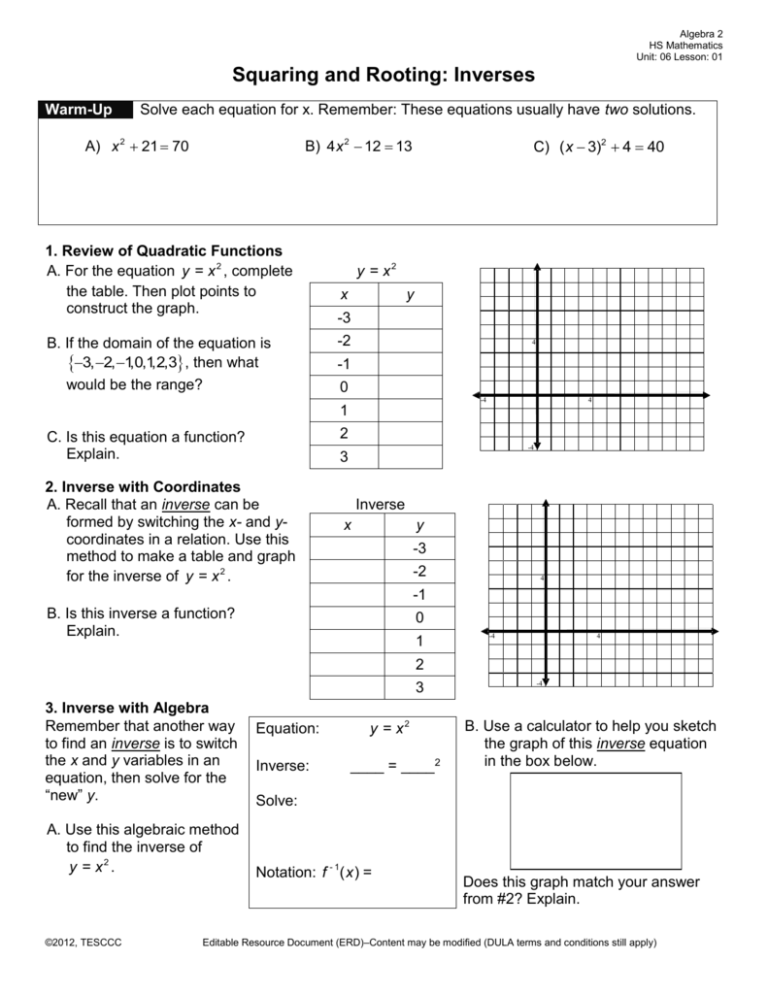
Algebra 2 HS Mathematics Unit: 06 Lesson: 01 Squaring and Rooting: Inverses Warm-Up Solve each equation for x. Remember: These equations usually have two solutions. A) x 2 21 70 B) 4 x 2 12 13 1. Review of Quadratic Functions A. For the equation y = x 2 , complete the table. Then plot points to construct the graph. B. If the domain of the equation is 3, 2, 1,0,1,2,3 , then what would be the range? C) ( x 3)2 4 40 y = x2 x y -3 -2 4 -1 0 -4 4 1 2 C. Is this equation a function? Explain. -4 3 2. Inverse with Coordinates A. Recall that an inverse can be formed by switching the x- and ycoordinates in a relation. Use this method to make a table and graph for the inverse of y = x 2 . Inverse x y -3 -2 4 -1 B. Is this inverse a function? Explain. 0 1 -4 4 2 3 3. Inverse with Algebra Remember that another way to find an inverse is to switch the x and y variables in an equation, then solve for the “new” y. A. Use this algebraic method to find the inverse of y = x2 . ©2012, TESCCC Equation: Inverse: y = x2 ____ = ____2 -4 B. Use a calculator to help you sketch the graph of this inverse equation in the box below. Solve: Notation: f - 1( x ) = Does this graph match your answer from #2? Explain. Editable Resource Document (ERD)–Content may be modified (DULA terms and conditions still apply) Algebra 2 HS Mathematics Unit: 06 Lesson: 01 Squaring and Rooting: Inverses These two relations are inverses of one another. Graph: What are the properties of inverses? y Graph: y Their graphs are _________________ over the x x line ___________ Equation: Their equations have the Equation: _______________ switched Shape: Shape: What’s the “PROBLEM” with this graph? This graph is ___________ a ________________! So, normally… We just graph the _______ ___________ and call it the _____________ _____________ function. Graph: Domain: Parent function: f (x) = x Table: x 0 1 4 9 __________________ (You can only use ____________ y 0 1 2 3 values for _____.) 2 Range: 2 4 6 8 __________________ (You will only get ____________ answers for _____.) ©2012, TESCCC Editable Resource Document (ERD)–Content may be modified (DULA terms and conditions still apply) Algebra 2 HS Mathematics Unit: 06 Lesson: 01 Squaring and Rooting: Inverses 4. Review of Quadratic Transformations x y 2x 2 2 -2 A. For the equation above, -1 complete the table. Then plot 0 points to construct the graph. 1 2 y 4 -4 4 B. This graph is a transformation of the parent graph y = x 2 . Tell how each constant in the equation changes the graph of the parent function. What affect does the “−2” have on the graph? What affect does the “2” coefficient have on the graph? 5. Inverse with Coordinates A. Again, recall that an inverse can be formed by switching the x- and y- coordinates in a relation. Use this method to make a table and graph for the inverse of y 2x 2 2 . x -4 y -2 -1 0 1 2 B. Is this inverse a function? Explain. 4 -4 4 -4 6. Inverse with Algebra Remember that another way to find an inverse is to switch the x and y variables in an equation, then solve for the “new” y. Equation: Inverse: y 2x 2 2 B. Use a calculator to help you sketch the graph of this inverse equation in the box below. Solve: A. Use this algebraic method to find the inverse of y 2x 2 2 . Notation: ©2012, TESCCC Does this graph match your answer from #5? Explain. Editable Resource Document (ERD)–Content may be modified (DULA terms and conditions still apply) Algebra 2 HS Mathematics Unit: 06 Lesson: 01 Squaring and Rooting: Inverses 7. Review of Quadratic Transformations y ( x 3)2 1 x 0 A. For the equation above, complete the table. Then plot points to construct the graph. y 1 2 4 3 B. This graph is a transformation of the parent graph y = x 2 . Tell how each constant in the equation changes the graph of the parent function. 4 -4 6 -4 What affect does the “−3” have on the graph? What affect does the “−1” have on the graph? 8. Inverse with Coordinates A. Again, recall that an inverse can be formed by switching the x- and y- coordinates in a relation. Use this method to make a table and graph for the inverse of y ( x 3)2 1 . 4 5 x y 0 1 2 4 3 4 B. Is this inverse a function? Explain. -4 4 5 6 -4 9. Inverse with Algebra Remember that another way to find an inverse is to switch the x and y variables in an equation, then solve for the “new” y. Equation: Inverse: y ( x 3)2 1 B. Use a calculator to help you sketch the graph of this inverse equation in the box below. Solve: A. Use this algebraic method to find the inverse of y ( x 3)2 1 . Notation: ©2012, TESCCC Does this graph match your answer from #8? Explain. Editable Resource Document (ERD)–Content may be modified (DULA terms and conditions still apply)
